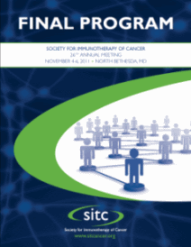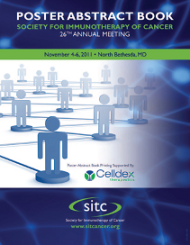SITC 26th Annual Meeting
Presenter Slides & Schedule | Supporters | Photos & Video
November 4-6, 2011
Bethesda North Marriott Hotel & Conference Center
North Bethesda, MD
The SITC Annual Meeting allows for scientific exchange of the most cutting-edge preclinical and clinical data on immunotherapies and biological therapy of cancer. The program included dynamic presentations, interactive
panel discussions and scientific posters on the most timely topics in cancer
immunotherapy as well as vital information on clinical trial design and regulatory issues to advance collaboration and translation of cancer immunotherapies.
Topics of the sessions and poster presentations included the immunobiology and application of dendritic cells, engineered receptors and adoptive cell therapies, inflammatory infiltrates in cancer, the immunology and immunotherapy of prostate cancer, cancer stem cells, state of the art animal models, uncoupling negative regulation in the tumor microenvironment, and high throughput technologies for immune monitoring. Additional poster-only topics included therapeutic monoclonal antibodies in cancer, immunotherapy combinations, innate immunity in cancer, tumor vasculature, chemokines and lymphocyte trafficking to the tumor, and targeted therapies and anti-tumor immunity.
SITC is ideally positioned to meet the identified needs of our attendees. SITC’s strength lies in its history of organizing successful scientific conferences that gather clinicians and scientists from around the globe to interact and discuss the most important issues in cancer immunotherapy. By addressing these needs, SITC advances effective, efficient research and interaction on promising cancer therapies with biological and immunological agents. Through its integrated programs, SITC promotes productive collaboration among scientists and with other organizations in the field. Ultimately this scientific exchange and collaborative environment will lead to better cancer patient outcomes with novel cancer immunotherapies.
The SITC Annual Meeting program format and content is designed to address identified needs/practice gaps and promotes:
- Exchange between basic and clinical researchers, thus improving the caliber of the science and promoting translation
- Discussion on potential hurdles in cancer immunotherapy from the trial design and regulatory perspective
- Integrated understanding of the state of cancer immunotherapy research in today’s environment, identification of potential funding opportunities, and mentoring of junior investigators
- Discussion of novel therapies and applications based on the research presented
- Interactions with industry to promote access to novel agents for clinical development
Audience
The target audience for this program was basic and clinical investigators from academic institutions, industry and regulatory agencies, including clinicians, basic and translational researchers, graduate students, post-doctoral fellows, and allied health professionals involved in cancer research.
Program Goals
- Exchange information on the most recent advances in tumor immunology and cancer immunotherapy
- Understand recent advances in biology and immunotherapy as they relate to specific cancers and various immunotherapy modalities, cell subsets, animal models, and aspects of negative regulation in the tumor microenvironment
- Identify promising research opportunities, new techniques and clinical applications incorporating these advances
- Establish dialogue between academia, industry and government on these advances
Expected Learner Outcomes
- Summarize the most recent advances in tumor immunology and cancer immunotherapy
- Integrate recent advances in cancer immunology and immunotherapy into basic, clinical and translational research
- Incorporate new research and techniques into clinical applications for cancer immunotherapy
- Establish and solidify collaborations among the various members of academia, industry, government and clinical practices to promote clinical evaluation of these advances in more efficient trials
Organizers
Charles G. Drake, MD, PhD – Johns Hopkins University
Dolores J. Schendel, PhD – Helmholtz Zentrum Muenchen – German Research Center for Environmental Health Institute of Molecular Immunology
Jeffrey Schlom, PhD – National Cancer Institute, National Institutes of Health
Jedd D. Wolchok, MD, PhD – Memorial Sloan-Kettering Cancer Center


